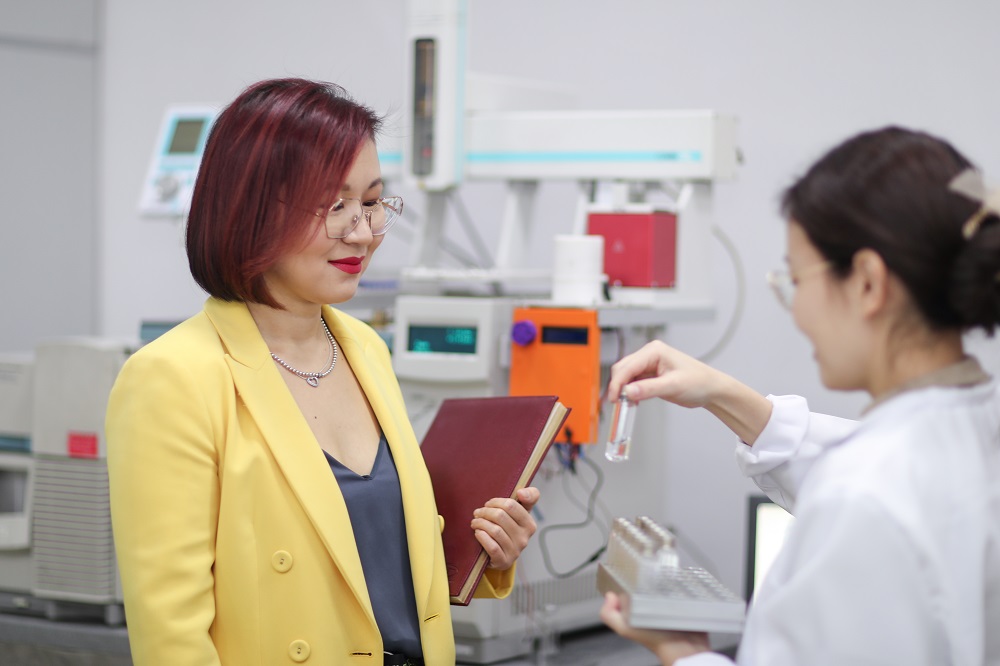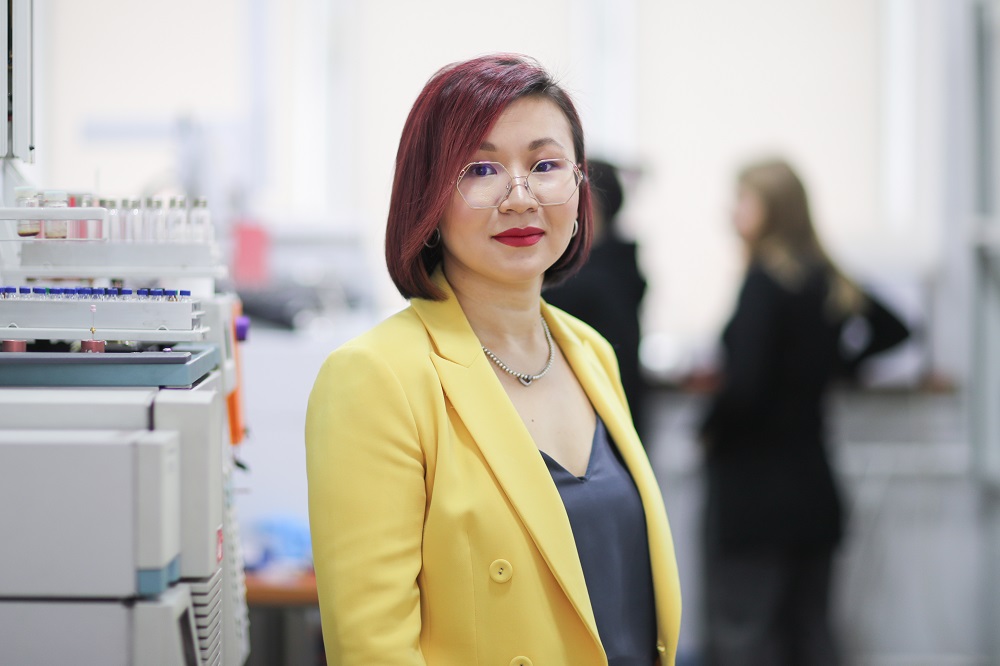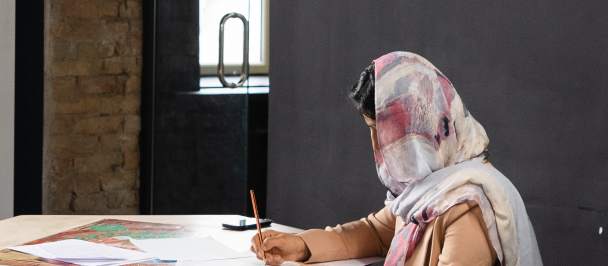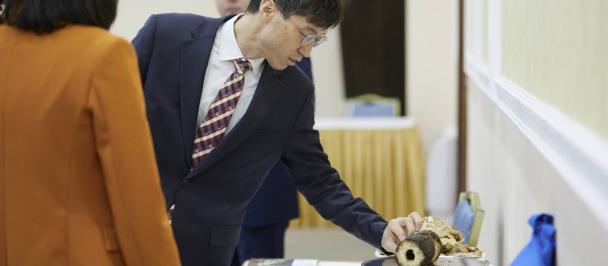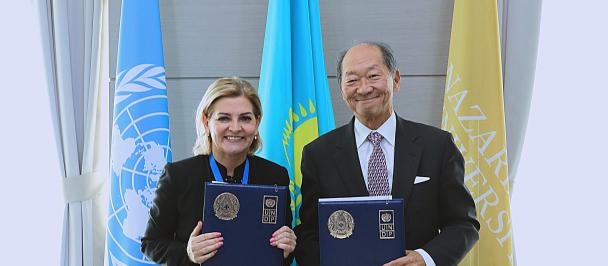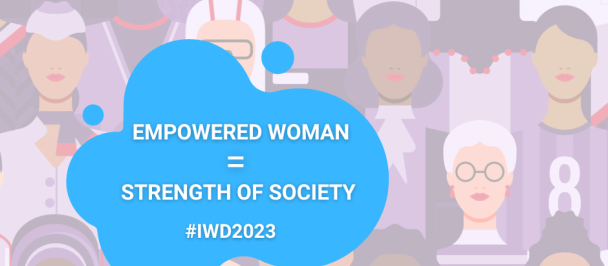Photo credit: UNDP Kazakhstan/Alexey Malchenko
Aiymgul Kerimray, ecologist, speaks out:
“Addressing the barriers impeding women’s advancement in science is crucial”
The International Day of Women and Girls in Science has been celebrated around the globe since 2016. The aim is to draw attention to the problem of gender stereotypes that impede women from realizing their full potential in science. In recent years the world community has made significant progress in integrating women and girls into the scientific world. According to the Ministry of Education and Science of RK information, the percentage of women scientists participating in scientific and research activities stands at 54 per cent nationally. However, gender stereotypes persist in society which constrain women from pursuing careers in particular occupations.
One of the outstanding young spokeswomen in the scientific world is Aiymgul Kerimray, researcher at Al-Farabi Kazakh National University, expert in the UNDP Climate Change Projects portfolio. The theme of her studies is the urban air quality in Kazakhstan and fuel poverty.
- Aiymgul, please tell us about your education and what made you choose this sphere of science.
I did my bachelor’s in physics at Al-Farabi Kazakh National University. In 2008, I obtained my master’s degree in environmental and energy engineering at the University of Sheffield, UK. In 2018, I obtained my PhD degree at Nazarbayev University.
At school, I had no idea about my future career, about which field I would choose. While studying at KazNU, at the faculty of physics, I realized that I wanted to choose another sphere of study. My family advised me to choose environmental studies because there were relative few experts in this sphere then. They predicted that in the future it could become a prestigious occupation. This was in 2006-2007. Today it’s clear that there is a very high demand for environmentalists, both in Kazakhstan and globally.
From 2009 to 2014, I worked in different positions: as an expert in the Ministry of Ecology, Geology and Natural Resources RK, in an NGO and then at the university where I realized that I should focus on scientific research in a major way. In 2014 I was enrolled in the Nazarbayev University PhD programme.
Photo credit: UNDP Kazakhstan/Alexey Malchenko
- What projects and studies are you engaged in currently?
Now my colleagues and I are mostly involved in studies focusing on atmospheric air quality, fuel poverty, the use of fuel in the household sector. Accordingly, we researched spatial-temporal differences in the air quality of Almaty, specifically, on differences by districts and seasons of the year. Another research project that we undertook was dedicated to the effects of the stay-at-home order, movement restriction measures which were introduced to reduce distribution COVID-19 cases,on air quality in Almaty.
At the same time, I took part in the research of fuel poverty and use of fuel in the household sector. One of the articles we published focuses on the access to energy for cooking in India, Kazakhstan, and Kyrgyz Republic. I also contributed to the development of the roadmap prepared by the International Energy Agency on transition to cleaner fuels in the household sector of Kazakhstan.
I am currently participating in a new research project that is aiming to study the contribution of sources to air pollution in Almaty by analyzing chemical composition of fine particulate matter PM.5.
- Clean air for a healthy life: is it a reality for Kazakhstan, or just a utopia?
I think we should set goals that are more realistic. For instance, to aim to reduce trends of concentration levels of air pollutants, which will also lead to a decrease of greenhouse gases concentration, as we have not observed any downward trend in recent years. For example, the air quality in winter 2021 in Almaty was worse than in 2020.
You can’t find 100 percent clean air even in the cleanest cities as there are always small concentrations of pollutants in the air.
It is essential, at least, to set intermediate, step-by-step goals to reduce the concentration of air pollutants. It is not at all easy to obtain better air quality; it requires systemic, often unpopular, and expensive, solutions in many sectors: in the power supply industry, municipal heating, urban planning, construction, for example.
Photo credit: UNDP Kazakhstan/Alexey Malchenko
- What advice to you have for those women just starting to make their way in science? Based on your own experience, what mistakes can they avoid?
First and foremost, it is vital to raise and discuss the barriers, preventing women and girls from the carriers in science. There is also a need for the state support measures to increase the number of women and girls engaged in this field. Equally important is to carry studies in this area.
I think women should assert their rights. We don’t know how many talented girls in Kazakhstan abandoned their scientific path because of lack of support of their academic community, their families, and the society in general.
We know that in our patriarchal society women usually do more domestic work than men. Of course, this prevents women from pursuing their career path. Therefore, it is essential to advocate for more gender equality, challenge traditional social norms and empower women to unleash their potential, exploring avenues to the carriers in science.
Women are extremely underrepresented in decision-making and leadership in terms of establishing, implementing, monitoring, and evaluating climate activities, according to Gulmira Sergazina, Portfolio Manager, UNDP Climate Change Projects. In her blog she notes the importance of women participating actively in climate change measures, and, as regards policy and programmes, these should meet the specific demands, challenges and priorities of women.

 Locations
Locations
